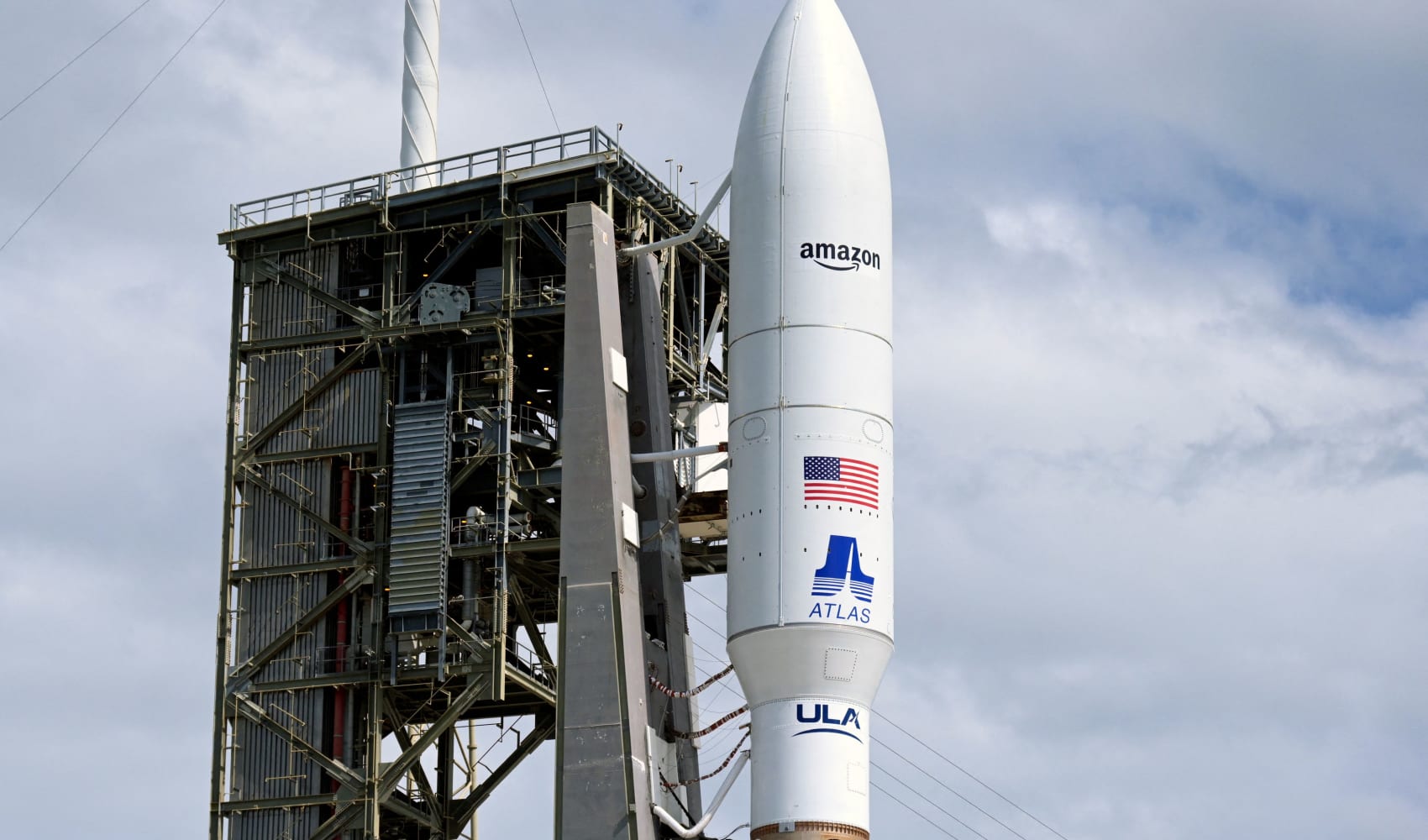Amazon Kuiper vs Starlink: Internet Space Race Begins!
Amazon Enters the Space Race: Kuiper Satellites Take Flight
The Dawn of a New Space Race: Amazon vs. Starlink
Hold on to your hats, folks, because the space race just got a whole lot more interesting! After a weather-related hiccup, Amazon has officially launched its first batch of Kuiper internet satellites into orbit. This marks a significant step in Amazon's ambitious plan to provide global internet access and a direct challenge to Elon Musk's already established Starlink.
Project Kuiper: Amazon's Bold Vision for Global Connectivity
So, what exactly is Project Kuiper? Simply put, it's Amazon's plan to deploy a massive constellation of thousands of satellites into low Earth orbit (LEO). These satellites will act as internet-beaming hubs, bringing high-speed, low-latency internet access to underserved communities around the world. Think of it as a giant, celestial Wi-Fi network, designed to bridge the digital divide.
Why is Amazon Entering the Satellite Internet Market?
The answer is simple: opportunity. The demand for reliable internet access is booming, and many regions still lack the infrastructure to support traditional broadband. Satellite internet offers a viable solution, especially in remote or geographically challenging areas. It's a huge market, and Amazon wants a piece of the pie.
Liftoff! The Kuiper Satellites Begin Their Journey
On Monday evening, a United Launch Alliance (ULA) Atlas V rocket soared into the Florida sky, carrying 27 Kuiper satellites. The launch, which took place from Cape Canaveral Space Force Station, marks a pivotal moment for Amazon and its quest to revolutionize internet access.
A Smooth Countdown and a Beautiful Liftoff
"We had a nice smooth countdown, beautiful weather, beautiful liftoff," exclaimed Caleb Weiss, a systems engineer at ULA, during the livestream. The successful launch is a testament to the hard work and dedication of the teams involved.
Starlink vs. Kuiper: A Head-to-Head Comparison
Let's be honest, the elephant in the room is Starlink. How does Kuiper stack up against Elon Musk's established satellite internet service? It's a fair question, and the competition is expected to be fierce.
Key Differences and Similarities
Both Starlink and Kuiper aim to provide global internet access via satellite constellations. However, there are some key differences. For example, Amazon's Kuiper project promises high-speed internet with lower latency compared to traditional satellite internet services, with their ultimate aim being directly competitive with Starlink.
- Constellation Size: Both plan to have thousands of satellites, but the exact numbers and orbital altitudes may differ.
- Target Market: Both are targeting underserved areas, but Amazon might have a slight advantage in reaching businesses due to its existing cloud infrastructure (AWS).
- Technology: While both use advanced technologies, there could be variations in antenna design, satellite communication protocols, and ground station infrastructure.
The Technical Prowess Behind Project Kuiper
Project Kuiper isn't just about launching satellites; it's about building a sophisticated, interconnected system. Amazon is investing heavily in advanced technologies to ensure its Kuiper satellites deliver reliable and high-performance internet access.
Advanced Antenna Technology
One of the key innovations is the development of advanced antenna technology. These antennas are designed to efficiently track and communicate with satellites, even in challenging environments. Think of them as highly sensitive ears, capable of picking up faint signals from space.
Ground Station Infrastructure
Of course, satellites need ground stations to communicate with. Amazon is building a network of ground stations around the world to ensure seamless connectivity. These ground stations act as gateways, connecting the satellite network to the terrestrial internet.
The Economic and Social Impact of Global Internet Access
The potential impact of projects like Kuiper and Starlink is enormous. By providing affordable and reliable internet access to underserved communities, they can unlock new economic opportunities, improve education, and enhance social connectivity. Imagine the possibilities!
Bridging the Digital Divide
One of the most significant benefits is bridging the digital divide. Access to the internet is no longer a luxury; it's a necessity. It’s crucial for education, healthcare, and economic opportunity. Kuiper could potentially help bring these benefits to billions of people.
Economic Growth and Innovation
Wider internet access can fuel economic growth by empowering entrepreneurs, connecting businesses to new markets, and fostering innovation. Think of it as planting seeds for a new era of economic prosperity.
Environmental Considerations and Space Debris Mitigation
With thousands of satellites being launched into orbit, there are valid concerns about space debris and the potential for collisions. Amazon is taking these concerns seriously and implementing measures to mitigate the risks.
Deorbiting Plans and Collision Avoidance
One of the key strategies is to design satellites that can be deorbited safely at the end of their lifespan. This ensures that they don't become space junk. Additionally, Amazon is implementing advanced collision avoidance systems to minimize the risk of collisions with other satellites or debris.
The Future of Satellite Internet: What's Next?
The launch of the first Kuiper satellites is just the beginning. Amazon plans to launch thousands more satellites in the coming years, gradually building out its global internet network. The competition between Amazon and SpaceX will drive innovation and accelerate the deployment of satellite internet services.
Expanding Coverage and Improving Performance
As more satellites are launched, the coverage area will expand, and the internet speeds will improve. This means faster downloads, smoother streaming, and more reliable connectivity for users around the world.
Lower Prices and Increased Accessibility
Competition often leads to lower prices. As Amazon and SpaceX battle for market share, consumers are likely to benefit from more affordable satellite internet plans.
The Regulatory Landscape: Navigating the Challenges
Operating a satellite internet network requires navigating a complex regulatory landscape. Amazon needs to obtain licenses and approvals from various government agencies around the world. This can be a challenging and time-consuming process.
International Cooperation and Coordination
Satellite internet is a global endeavor, requiring international cooperation and coordination. Amazon needs to work with governments and other stakeholders to ensure that its operations are sustainable and do not interfere with other satellite systems.
Amazon's Other Space Ventures: Beyond Kuiper
While Project Kuiper is Amazon's most prominent space venture, it's not the only one. Amazon founder Jeff Bezos also owns Blue Origin, a space exploration company that is developing rockets and spacecraft for commercial and scientific missions.
Blue Origin and the New Space Age
Blue Origin is playing a key role in the new space age, pushing the boundaries of space exploration and making it more accessible to private companies and individuals. It’s creating a “road to space” infrastructure that can foster innovation and spur economic growth.
The Potential Downsides: Concerns and Criticisms
Like any large-scale project, Project Kuiper has faced some criticism. Concerns have been raised about the potential impact on astronomy and the increased risk of space debris. It is important to address and mitigate these concerns.
Impact on Astronomy
The bright reflections from thousands of satellites can interfere with astronomical observations. Amazon is working with astronomers to develop strategies to minimize this impact, such as adjusting satellite orientations and applying coatings to reduce reflectivity.
Conclusion: A Giant Leap for Connectivity
The successful launch of Amazon's first Kuiper satellites marks a significant milestone in the quest for global internet access. This bold initiative has the potential to transform lives and economies around the world by bridging the digital divide and unlocking new opportunities. While challenges remain, the future of satellite internet looks bright, with Amazon and SpaceX leading the way.
Frequently Asked Questions
- What is Project Kuiper?
- Project Kuiper is Amazon's initiative to launch a constellation of thousands of satellites into low Earth orbit to provide global broadband internet access, particularly to underserved communities.
- How does Kuiper compare to Starlink?
- Both aim to provide satellite internet. While similarities exist, Kuiper distinguishes itself with AWS integration and focuses on high-speed, low-latency connections, directly competing with Starlink in the market.
- When will Kuiper internet service be available to the public?
- While no official date has been announced, with the launch of the initial satellites, Amazon is expected to begin beta testing in the near future with a broader rollout following successful trials.
- How much will Kuiper internet service cost?
- Pricing details are not yet available, but Amazon will likely offer competitive pricing to attract customers. Factors like data usage and location will likely influence cost.
- What will I need to access Kuiper internet?
- Users will require a special antenna to communicate with the Kuiper satellites. This antenna will likely be provided by Amazon and installed at the user's location.

